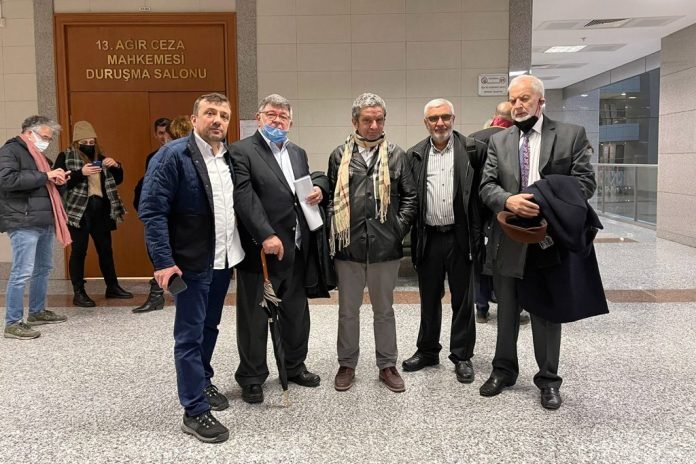Four former columnists from the now-closed Zaman daily appeared in an İstanbul court on Monday in the latest hearing of a retrial during which the court handed down prison sentences of varying lengths to the defendants, Turkish Minute reported, citing the Demirören News Agency (DHA).
The retrial of columnists Şahin Alpay, Mümtaz’er Türköne, Ahmet Turan Alkan and Ali Bulaç and former Zaman editor Mehmet Öztürk became possible after the Supreme Court of Appeals in December 2020 overturned a local court’s verdicts against the five journalists. The top court ruled that the sentences handed down to Türköne, Bulaç and Alpay on charges of membership in a terrorist organization as well as an acquittal decision for Öztürk were flawed.
According to DHA the İstanbul 13th High Criminal Court on Monday sentenced Bulaç, Alpay and Turan to two years, six months in prison each on charges of “aiding an armed terrorist organization without being a member of it,” while giving a jail sentence of three years, nine months to Türköne on the same charges.
The court also decided to separate the file of the fugitive defendant Özdemir and ruled for the continuation of his arrest warrant.
The Zaman daily, which was Turkey’s best-selling newspaper, was closed down along with dozens of other media outlets due to their links to the Gülen movement, which is labeled by Turkey’s Justice and Development Party (AKP) government as the mastermind of a failed coup on July 15, 2016 and a “terrorist” organization. The movement strongly denies any involvement in the failed putsch or terrorist activity.
The columnists had been arrested in the aftermath of the coup attempt as part of a crackdown on journalists critical of the government and journalists who used to work at Gülen-affiliated media organizations.
They denied the charges against them and demanded their acquittal, saying their activities at the Zaman daily were merely journalistic and that they had nothing to do with the coup attempt.
Türköne on Monday said the case against them had been continuing for six years and that they had said everything that they should by now.
“The crimes that caused me to spend four years and two months in prison are [based on] just newspaper articles. The headlines [of the articles] in the newspapers are shown as evidence. I’m having trouble understanding this. Unlike the others, I spent two-and-a-half years more in prison. It was stated that it was because I didn’t show any sign of remorse. Let me be clear, I haven’t done anything that I would regret,” he said.
It is common for journalists in Turkey, which has a poor record on freedom of the press, to face threats, physical attacks and legal harassment due to their work.
Rights groups routinely accuse the Turkish government of trying to keep the press under control by imprisoning journalists, shutting down media outlets, overseeing the purchase of media brands by pro-government conglomerates and using regulatory authorities to exert financial pressure, especially since President Recep Tayyip Erdoğan survived the failed coup in July 2016.
Turkey, which is one of the top jailers of journalists in the world, was ranked 149th among 180 countries in the Reporters Without Borders (RSF) 2022 World Press Freedom Index, released in early May.















